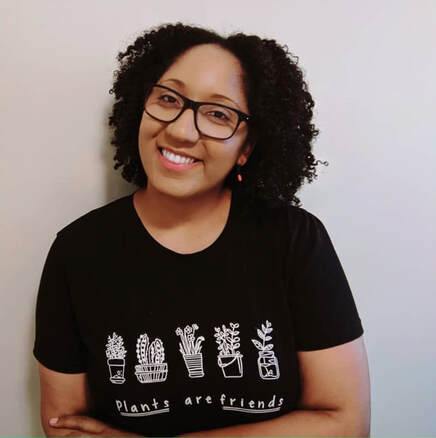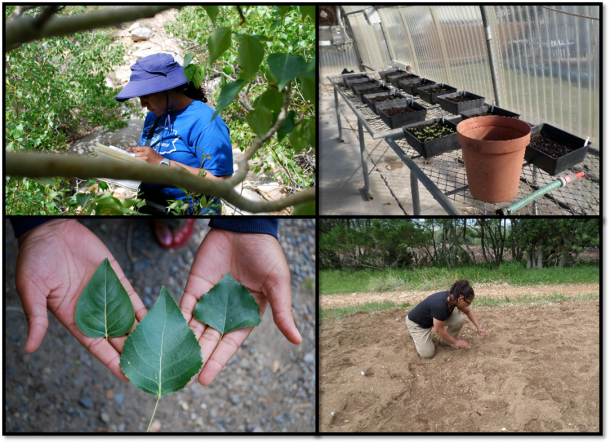Dr. Tanisha Williams is a plant ecologist and botanist, as well as founder of #BlackBotanistsWeek, an online initiative to “promote, highlight, and create a safe place for Black people who love plants.”
Nature talked with the Washington, D.C. native about her inspirations, her hopes for the future and what’s next for #BlackBotanistsWeek.

Photo courtesy of Dr. Tanisha Williams
Q: Tell us a little bit about your background and what sparked your love of nature and plants. Was your family particularly interested in nature?
Tanisha Williams (TW): I was born and raised in Washington, D.C. I have always had a love for nature. My family nurtured that love through hiking and camping trips throughout D.C., Maryland and Virginia. I was also exposed to nature through my local Girl Scout organization. My troop leader took us on a number of camping trips that all included epic hikes to beautiful overlooks and waterfalls. I attribute my love for plants to my great grandmother. She kept beautiful plants all throughout our home. My favorite plant memory is of touching the fuzzy leaves of the African violets!
Q: How long have you been interested in plant ecology? Tell us a bit about your work.
TW: My plant ecology interests really took off during my PhD at the University of Connecticut. I am passionate about conserving biodiversity, which includes how plants will respond to the great impacts they are currently experiencing and projected impacts due to human-caused climate change. One way to assess plant responses to climate change is to use herbarium records, dried plant collections. I have used such records to study how flowering has changed over the past century in a native South African plant genus called Pelargonium. Temperatures during this time period have increased by almost 3 oC and plants have responded by flowering a week early.
Q: How did Black Botanists Week start? Was it part of the #BlackBirdersWeek momentum and/or #BlackAFinSTEM to ensure representation in these fields of study and recreation?
TW: Yes, Black Botanists Week stemmed from Black Birders Week/BlackAFinSTEM, and the events leading up to this week. I participated in Black Birders Week and felt a sense of joy. It was nice seeing so many Black people enjoy nature, hiking, and birding. I wanted to bring that joy and representation to the botanical fields.
Q: What was going through your mind during the Christian Cooper birdwatching in Central Park aftermath? Have you had incidents or experiences like that?
TW: It was the same thing that always goes through my mind when these traumas happen: 1. I hope they make it out of this situation alive, and 2. How many more Black people have to be traumatized and/or killed before enough is enough?
Thankfully, I have not had someone falsely call the cops on me while in an outdoor space.

Photo courtesy of Dr. Tanisha Williams
Q: Tell us more about Black Botanists week: is there a team behind it? What has the response been? What sort of events do you organize?
TW: I couldn’t have done this without the help from the Black Botanists Week committee members. There are twelve committee members from the United States, United Kingdom and South Africa. We pride ourselves in having a committee as diverse as the plants we love. We have members from within and outside of academia, and at many different career stages.
We have received nothing but positive praise and support from individual people and organizations. We know there is a need for representation and are making Black Botanists Week an annual event to celebrate Black people who love plants. We have also partnered with Holden Forests and Gardens to put on a lecture series, titled “Growing Black Roots: The Black Botanical Legacy.” This series is held online every second Wednesday of the month at 7 pm EST.
Q: More about your hopes for the field: What advice do you have for people looking to get into natural history fields of study or who aren’t sure how to explore their love of nature? What would you like to see happen with regards to making the outdoor industry and environmental space more diverse?
TW: I hope people will connect with us and other groups that are promoting diversity in botany and other environmental fields. Our group is active on Twitter @BlkBotanistsWk. I also encourage people to look locally. There are often clubs at a nearby botanical garden, museum, etc. that you can reach out to. Find out what their members are doing and how you can get involved.
I hope the outdoor and environmental industries want to make a change and see the value in having diverse representation. I hope that representation is seen not only on a brochure but also at every level throughout the organization. In this great age of information, organizations have access to many diversity, equity and inclusion (DEI) trainings and tools to help erase biased practices and create an antiracist environment. Lastly, I hope initiatives, like Black Botanists Week, continue to highlight the wonderful contributions diverse groups add to the outdoor industry and environmental space.
Q: What do you want everybody to know about your passion?
TW: Plants are amazing organisms! People forget that every aspect of our lives is dependent upon plants: air, food, water, medicine, etc. etc. etc.!!
